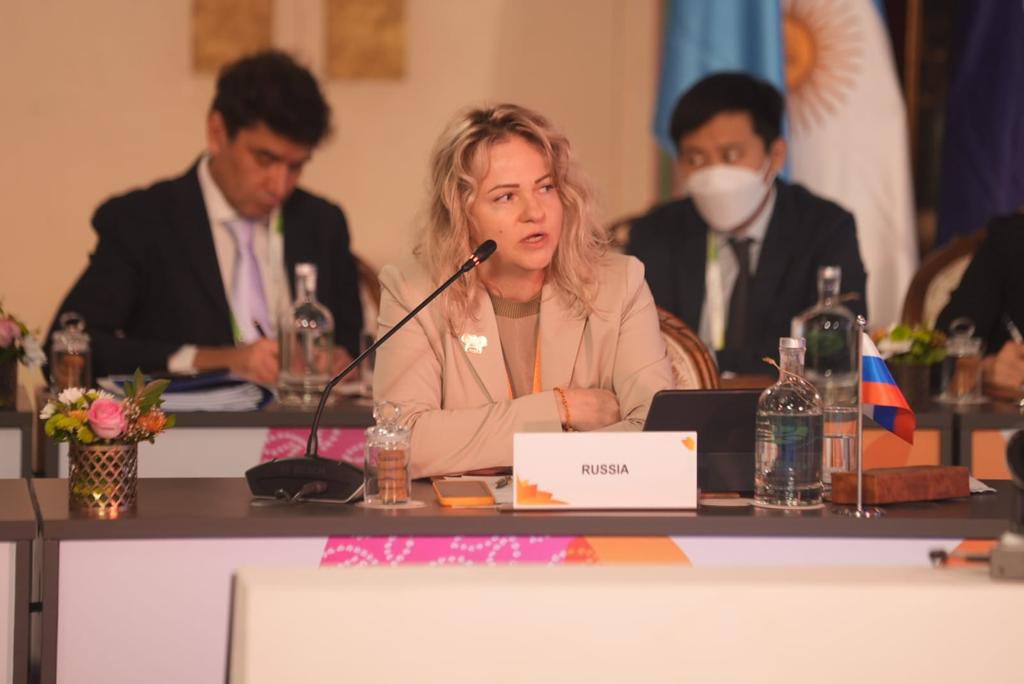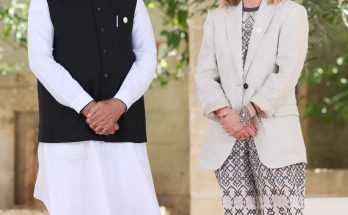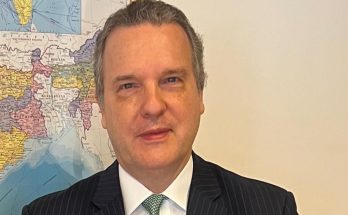
Amid increasing global polarisation triggered by the Ukraine crisis, Russia’s Sherpa to G20 Svetlana Lukash was a picture of poise and elegance as she attended the first Sherpa Meeting under India’s G20 presidency in the lake city of Udaipur. She has participated in over 11 G-20 summits. In a luxury hotel on the banks of Lake Pichola, Ms Lukash told Manish Chand, Editor-in-Chief, India and The World and Director, Centre for Global India Insights (CGII), that Russia sees India as the voice of the global South in G20, which “can heal and unite, rather than promote differences and divides.” In this conversation, she also stresses on the role of India’s G20 presidency in accelerating reform of global governance institutions to make the world order more representative of contemporary realities.
(Excerpts from the interview)
Q) What are your expectations from India’s first-ever presidency of G20? In what ways can India make a difference?
A) Let me welcome the Indian people and say that the Indian presidency of G20 was very much expected by all the developing world and all the emerging market economies. We now have the continuation of the emerging market economies presidencies, started with Indonesia, followed by India, and then the baton will be handed over to Brazil and South Africa. India has taken over G20 presidency at a critical time when we have the major goal of achieving Sustainable Development Goals, of supporting the developing countries in their efforts for equal and fair economy and achieving all the needed goals and developing their economies for the sake of the people. At this time, it is very important that the G20 voice is heeded and led not only by one of the major economies in the world, but also the major voice of the global South.
Going forward, we expect that India’s presidency of G20 will lead to a difference in the G20 approach, which has been dominated by the voice of the Western countries for a long time. So, with India, and then Brazil, and then South Africa, presiding in G20, we will bring the voice of the BRICS economies into the major forum of world’s leading economies. In this context, SDGs is the main priority that should be focused by emerging market economy countries.
Q) India sees its G20 presidency as an opportunity to position itself as the voice of the Global South. In what way India can be the voice of the Global South of developing countries and emerging economies?
A) First of all, India is the world’s largest democracy. And it always promotes a fair and equal approach to all the issues that are on the global agenda. So right now, we are facing the need to fight inequality. We are facing the need to save the climate, we are facing the need to improve lives of our people in terms of access to electricity, in terms of food security, in terms of bringing more women and girls into our economy. And these are exactly the priorities of India’s presidency. We hope that India will add value to the global agenda in all these aspects. Russia’s views on these areas are similar to India’s and we will support India’s initiatives in G20.
Q) Reform of global governance institutions is an important priority of India’s G20 presidency. It is also an important issue in BRICS. Do India and Russia share India’s focus on making the world more representative and democratic? In what ways can India and Russia collaborate in G20to make the international order more democratic?
A) I think the G20 agenda, since its inception at the level of leaders in 2008, revolved around the reform of international governance architecture. It is important that G20 continues cooperation to advance reform in the international economic and financial governance institutions. So the Bretton Woods Institutions, including the IMF and the World Bank, need to reflect and provide greater say to emerging market economies.
We also need reform of the World Trade Organization and the World Health Organization. Right now, G20 is not moving fast in this direction. With the ambition and efforts of India’s presidency, I think we can move further in this direction and make the multilateral economic governance fairer and more representative of contemporary world realities and views of emerging market economies.
Q) Russia is a very important player in food security and energy security which have been impacted by the Ukraine crisis. In what ways can Russia advance India’s agenda of food security and energy security under India’s G20 presidency?
A) I think if the G20 under India’s leadership could further promote recent decisions this year at the G20 summit in Bali on the access of food and fertilizers from Russia and other countries to the world market, that would be a great effort in promoting food security all over the world. This will be in the interests of developing countries.
Looking ahead, India can be the true moderator and impartial Chair of the world’s leading economies, and can bridge the views, can bring everyone together, can heal the world, rather than promote differences and divides. I hope and I am confident that we will have a successful Delhi Summit in September.

(Manish Chand is CEO-Editor-in-Chief, India Writes Network, and India and The World magazine. He is Director, Centre for Global Insights India, a think tank focused on global affairs)
Author Profile

- Manish Chand is Founder-CEO and Editor-in-Chief of India Writes Network (www.indiawrites.org) and India and World, a pioneering magazine focused on international affairs. He is CEO/Director of TGII Media Private Limited, an India-based media, publishing, research and consultancy company.
Latest entries
 India and the WorldJuly 9, 2024Defying West, India sets $100 billion trade target with Russia
India and the WorldJuly 9, 2024Defying West, India sets $100 billion trade target with Russia India and the WorldJuly 5, 2024India at SCO: Takes swipe at Pakistan for cross-border terror, pushes alternative to BRI
India and the WorldJuly 5, 2024India at SCO: Takes swipe at Pakistan for cross-border terror, pushes alternative to BRI India and the WorldJune 14, 2024Modi’s Day 1 in Italy: Bonding with Britain, France
India and the WorldJune 14, 2024Modi’s Day 1 in Italy: Bonding with Britain, France India and the WorldJune 13, 2024G7 summit in Italy: Modi to showcase India as leader of Global South
India and the WorldJune 13, 2024G7 summit in Italy: Modi to showcase India as leader of Global South






